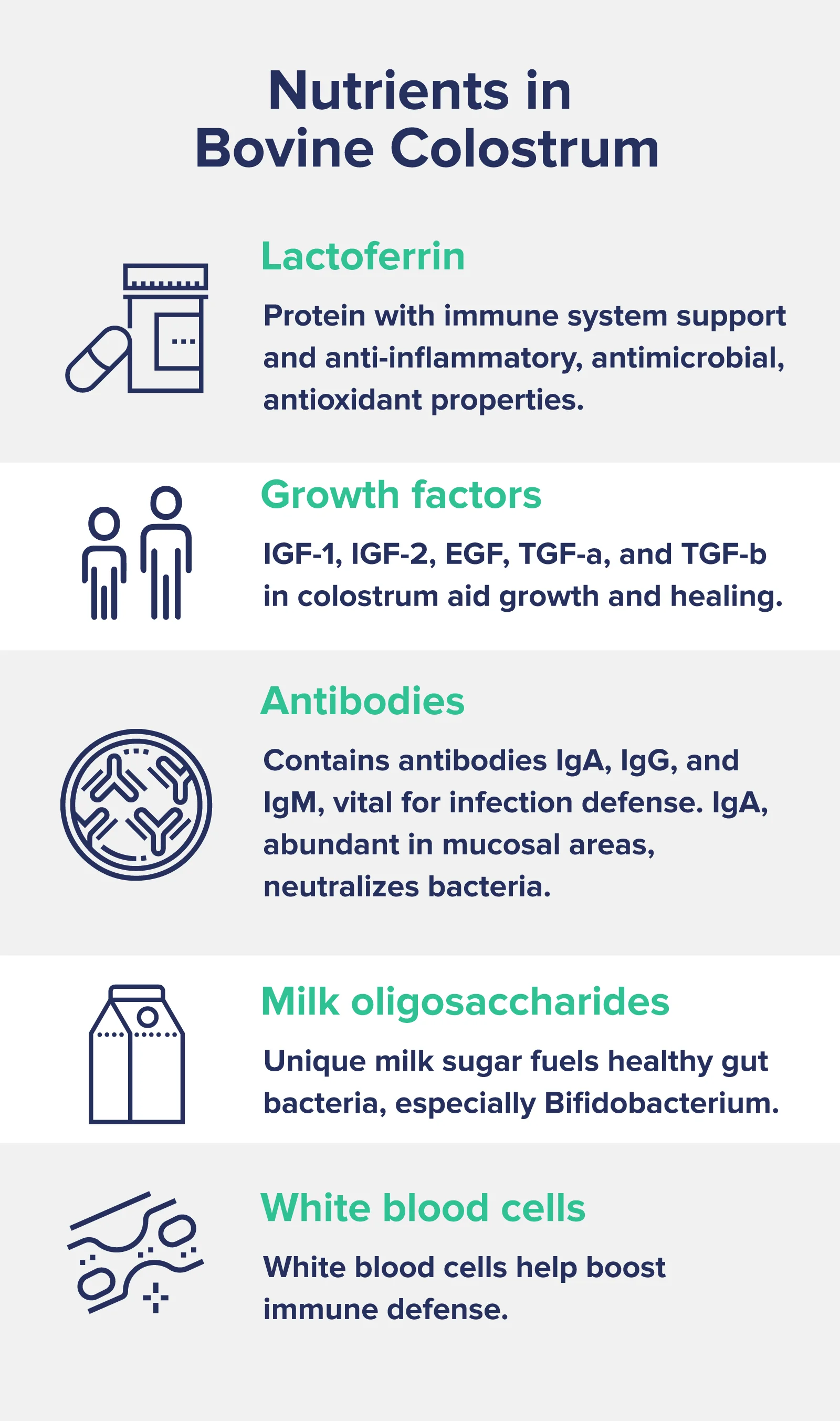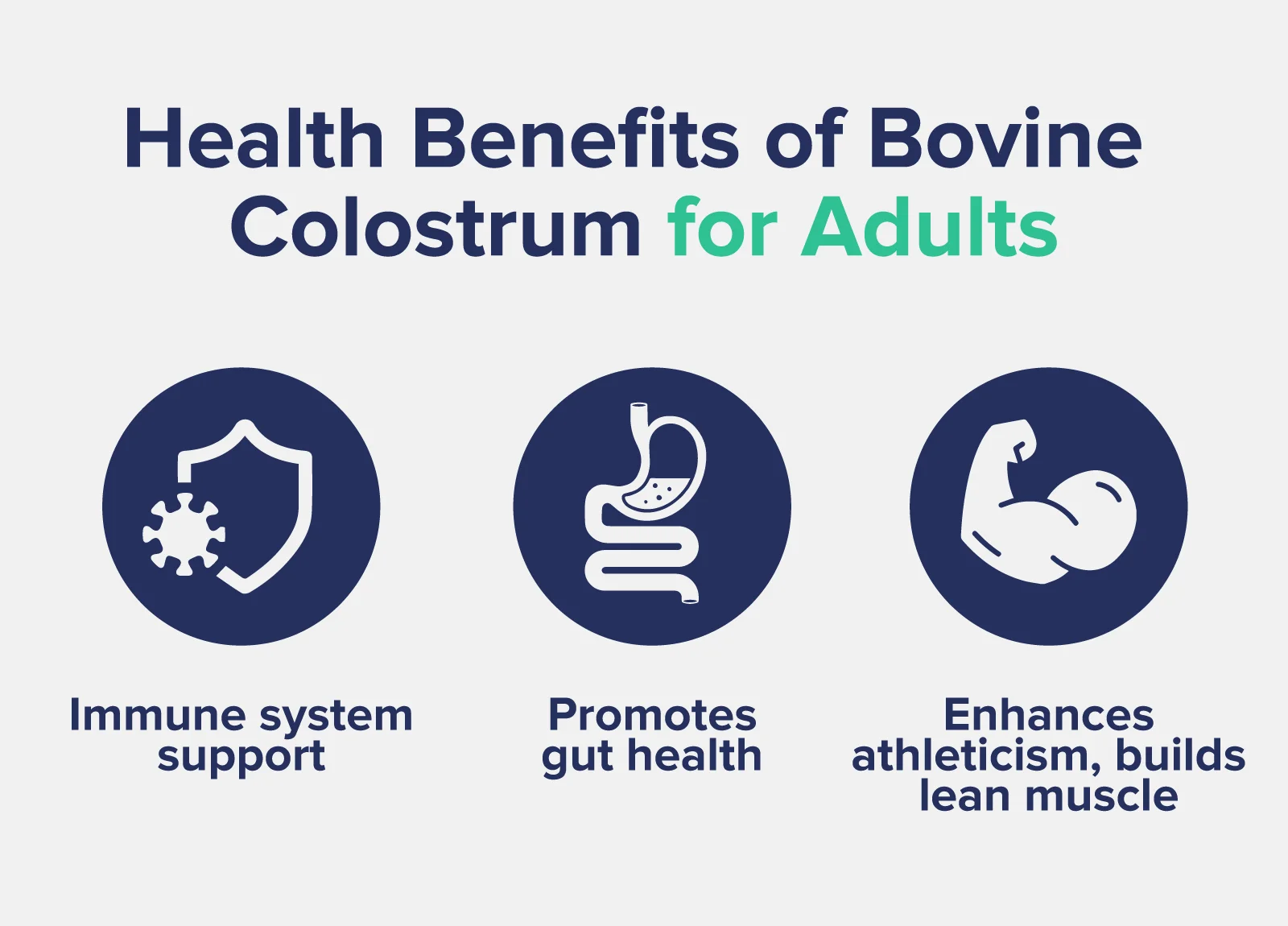Try our favorite, clean protein powder: See our top pick →
Try our favorite, clean protein powder: See our top pick →
This post contains links through which we may earn a small commission should you make a purchase from a brand. This in no way affects our ability to objectively critique the products and brands we review.
Evidence Based Research To fulfill our commitment to bringing our audience accurate and insightful content, our expert writers and medical reviewers rely on carefully curated research.
Read Our Editorial Policy
Anyone who has breastfed a baby knows firsthand what colostrum is—but yet another TikTok trend has taken the world by storm in the past couple of years, leading to colostrum now being known for much more than the “liquid gold” your newborn drank in the first few days of their life.
Unlike what your breastfed baby consumes, colostrum supplements on the market today are made from bovine colostrum—the nutrient-rich fluid that comes before breast milk—from cows who recently gave birth. (All mammals produce colostrum, but only bovine colostrum supplements exist—for now, at least.)
But are bovine colostrum supplements just another wellness trend with an incredible marketing team, or is there some merit behind it?
In this article, we’ll break it down for you, uncovering what the science says and what is simply “udder” nonsense. (Sorry, had to!)
For a TL;DR, bovine colostrum has credible evidence for supporting immunity and gut health and might aid in post-exercise recovery and muscle growth, but more research is needed.
Human colostrum is a highly nutritious component that comes just before breast milk, typically lasting about 2 to 5 days after giving birth.
Unlike breast milk, which is much more liquid, colostrum is thicker, yellow-colored, and often sticky. Some mothers see colostrum come through in the third trimester, while others don’t have it appear until after giving birth.
Colostrum is sometimes referred to as “liquid gold” or “first milk,” as it’s incredibly nutrient-concentrated with a minimal amount of liquid—which is perfect for a newborn’s tiny, marble-sized stomach.
It provides newborn infants with antibodies, growth factors, fats, proteins, carbohydrates, micronutrients, and enzymes that promote immune system function, muscle and tissue growth (especially in preterm infants), and gut health.
Colostrum can also prevent jaundice, promote gut motility (leading to a baby’s first poop), and is very easily digestible.
Bovine colostrum is similar to human colostrum, with the main and obvious difference being that it comes from lactating cows instead of humans.
In dietary supplement form, bovine colostrum is pasteurized before being dried into pills or powders that can be mixed with liquids. Like human colostrum, bovine colostrum is also yellow in color, often resembling buttermilk.
Ounce for ounce, bovine colostrum is much more nutritious than regular cow’s milk, providing more protein, fat, carbohydrates, and vital nutrients like magnesium, B vitamins, and vitamins A, C, and E.
However, the nutritional benefits of colostrum go above and beyond macro- and micronutrients—its primary claim to fame is its collection of growth factors, hormones, and digestive enzymes.

Bovine colostrum is rich in the following bioactive substances:
When it comes to adults, the same types of nutrients and bioactive substances are found in bovine colostrum, likely leading to similar results that you’d see in infants receiving human colostrum.

One of the most touted benefits of colostrum is its link to immune function due to its high concentrations of antibodies (like secretory IgA and IgG) and white blood cells.
In particular, bovine colostrum is thought to prevent upper respiratory tract infections (URTIs).
In a meta-analysis of 7 trials with 445 participants, bovine colostrum supplementation significantly reduced the incidence of URTIs by up to 36%.
Colostrum benefits the upper respiratory tract, similar to how it affects the gut—via the mucosal barrier. Both the respiratory tract and digestive tract have a delicate mucosal lining that is prone to injury and inflammation, and colostrum’s growth factors are thought to strengthen or regenerate the cells of these linings.
A small study of 29 male cyclists found that taking 10g of bovine colostrum for five weeks prevented a post-exercise decrease in immune cells and reduced the risk of upper respiratory infection symptoms compared to a placebo.
However, a meta-analysis of 10 randomized controlled trials found little to no improvement in several markers of immune function (serum immunoglobulins, neutrophils, and lymphocytes) after supplementing with 10 to 25g of bovine colostrum per day.
Some researchers speculate that the pasteurization process can denature or kill the beneficial components of colostrum (like antibodies), lessening its value to immune function. Plus, research has shown that commercial colostrum supplements have vastly different levels of bioactive compounds like immunoglobulins, meaning that you can’t expect all colostrum supplements to act the same or produce the same benefits.
Human milk colostrum is known to improve digestive health in infants, and the same seems to be true for adults taking bovine colostrum.
Research shows that bovine colostrum can promote gut health in several ways:
One small study with athletes found that taking 20g of bovine colostrum per day blunted the typical post-exercise rise in intestinal permeability by 80%, whereas people in the placebo group had a 2.5-fold increase in gut permeability.
Other research has shown that bovine colostrum can improve symptoms in people with ulcerative colitis (UC), a form of inflammatory bowel disease (IBD).
In a very small study of just 14 people with ulcerative colitis, those who were taking traditional UC medications in addition to bovine colostrum (in enema form) had a greater reduction in UC symptoms than those taking the medication alone.
It’s also known that bovine colostrum can help prevent diarrhea in healthy adults, children with infectious diarrhea, and people with gastrointestinal disorders.
However, more research with larger sample sizes is needed to verify the benefits of bovine colostrum in people with ulcerative colitis or Crohn’s disease (the other form of IBD).
Some evidence suggests that bovine colostrum can benefit athletic performance or lean body mass growth.
A small study with soccer players looked at muscle recovery between those taking a low dose of bovine colostrum (3.6g per day) or whey protein for six weeks.
The researchers found that those taking bovine colostrum had improved performance and reduced exercise-induced muscle damage after undergoing a running and sprinting test designed to simulate the demands of a soccer game.
In cyclists, higher doses of bovine colostrum (20 to 60g per day) led to a small but significant improvement in time trial performance after a 2-hour ride.
Bovine colostrum may also support lean body mass and strength, as seen in this study with older adults. In males and females over age 59, taking 60g of bovine colostrum for eight weeks led to significant increases in leg press strength compared to those taking whey protein.
Colostrum also improved upper body strength, muscle thickness, lean tissue mass, and cognitive function, but not more so than whey protein.
As a note, some people have had concerns about the IGF-1 content in bovine colostrum and its effects on competitive athletes and drug tests. (IGF-1’s growth-promoting properties have led to it being on the prohibited list of the World Anti-Doping Agency.)
In 2013, the World Anti-Doping Agency (WADA) stated that bovine colostrum contains high levels of IGF-1 and other growth factors that could influence the outcome of a doping test, and for this reason, they do not recommend its consumption—but they do not ban colostrum itself.
However, research has shown that supplementing with standard doses of bovine colostrum (20-40g per day) does not raise circulating levels of IGF-1 and should not show up on a drug test.
While this study showed that taking colostrum did not significantly raise plasma IGF-1 levels, as mentioned, not all bovine colostrum products contain the exact same amounts of any bioactive compounds.
Therefore, if you are involved in athletic competitions that require drug testing, you may not want to gamble with taking bovine colostrum—at least in large doses.
There are some potential downsides or side effects of bovine colostrum. Like with all dietary supplements, bovine colostrum is not regulated by the FDA. Therefore, you should ensure that you only use bovine colostrum supplements that have been third-party tested for purity, potency, and contaminants.
As mentioned, bovine colostrum supplements can vary widely in terms of their bioactive compound activity. Research has found that almost 60% of colostrum produced on US farms did not meet the minimum immunological and bacteriological criteria to support newborn calf health.
Bovine colostrum (like all dairy products) may also contain antibiotics, pesticides, or synthetic hormones, depending on how the cow was raised and what it ate.
While bovine colostrum is not known to cause major side effects, some people have reported digestive discomfort, especially if taking large doses.
There is also a concern about bovine colostrum causing acne. While there are no scientific studies here, many people report anecdotally that bovine colostrum supplements cause breakouts. This is likely because of the IGF-1 content in colostrum, which is linked to acne development.
There is also a food safety concern, as several pathogens have been found in raw bovine colostrum, including contamination with Mycobacterium, Paratuberculosis, Mycoplasma, Escherichia coli (E. coli), and Salmonella. However, these bacteria should be eliminated by pasteurization.
Lastly, there are questions about the ethics of bovine colostrum—see the first FAQ for more details about this.
It depends. Popular brands like ARMRA state that they only use surplus colostrum for their supplements, collected after baby calves finish feeding and receive all the nutrients they need.
However, it could be argued that this is still not ethical. In humans, a lactating mother produces just the right amount of colostrum for her baby—for example, a mother of twins will produce more colostrum than a mother of one baby. If the same translates to cows, then a baby calf should be the recipient of all of the colostrum produced by its mother.
Plus, according to the Institute of Agriculture and Natural Resources at the University of Nebraska-Lincoln, the number of calves in North America that do not receive adequate colostrum ranges from 11 to 31%.
In any case, if you take bovine colostrum, you should ensure that the brand describes how their colostrum is gathered and see that it is third-party tested.
Bovine colostrum is most known for its role in supporting immune function and gut health. It may reduce the risk of upper respiratory tract infections, prevent intestinal permeability, and reduce symptoms of inflammatory bowel disease. Some research has suggested that it may promote muscle recovery or lean body mass, including increasing strength in older adults.
People who are allergic to dairy should not take bovine colostrum. You may also want to avoid bovine colostrum if you have hormone-sensitive cancer (i.e., breast, ovarian, endometrial, etc.) because of the trace amounts of estrogen in colostrum. Talk to your doctor first if you are unsure if you should take bovine colostrum.
As a quick aside, bovine colostrum also contains the hormones prolactin, somatostatin, oxytocin, luteinizing hormone-releasing hormone, thyroid-stimulating hormone, thyroxine, calcitonin, and progesterone.
As long as the bovine colostrum does not contain microbial contaminants, there are no major side effects of taking colostrum. Some people experience digestive issues from high doses, but that seems to be rare.
In general, bovine colostrum is thought to be anti-inflammatory, but it also contains growth factors like IGF-1, which can have both anti-inflammatory and pro-inflammatory properties. This is one reason why acne-prone people can experience more breakouts when taking bovine colostrum.
Subscribe now and never miss anything about the topics important to you and your health.